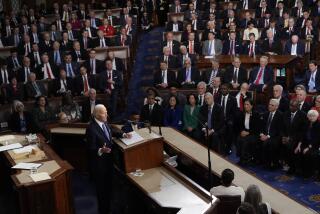Dreary outlook on home prices
Real estate experts who were troubled by a 10% drop in median home prices near the end of last year from the previous year probably were stunned by the 35% drop in values since then.
But that may be overshadowed by what they now worry lies ahead.
Growing unemployment, more declines in consumer spending and a particularly long and deep recession are expected to batter home prices even further next year, they said.
“As unemployment keeps rising, demand for housing softens. It will probably get worse before it gets better,” said Delores A. Conway, director of USC’s Casden Real Estate Economics Forecast.
And the ripple effect is pushing rents down, which in turn could put greater pressure on home prices and exacerbate the downward spiral.
Overbuilding in some areas and hard economic times have driven apartment vacancies up, and that is causing rents to stagnate or fall, Conway said.
In downtown Los Angeles, for instance, apartment rents were about the same in the third quarter this year as they were in the same period a year ago, halting the rise in rents in previous years, Conway said. In Hollywood, apartment rents fell 2% in the third quarter compared with a year ago, she said.
Data on single-family home rentals are less complete, but real estate agents in areas with numerous foreclosures say rents for houses are falling as the supply of vacant houses for rent exceeds demand.
Those falling rents could offset any boost to home sales from currently low interest rates and prices, economists said. For those able to qualify for mortgages and willing to buy a home, terms have become quite favorable.
At the end of November, Southern California’s median home sales price had fallen to $285,000, from $435,000 in November 2007. If median prices were to continue falling at that pace, they would be below $200,000 a year from now.
But even bearish forecasters don’t expect so severe a decline. More likely, prices in Southern California will settle in late 2009 at a level roughly 55% below their peak, said Christopher Thornberg, a Los Angeles economist.
That would amount to a price near $230,000, a level at which home prices would be roughly in line with incomes by historical norms.
The rapid drop in home prices this year has helped to bring previously inflated prices closer to normal levels. About 20% of Los Angeles-area residents could afford to buy a median-priced home at the end of September, according to a National Assn. of Home Builders index. A year before, only 2% could make such a purchase, based on area income levels.
The typical monthly payment for such a home in November would be just over $1,300, according to the real estate information service MDA DataQuick. That’s down from $2,049 a year earlier. Adjusted for inflation, the $1,300 monthly payment would be 37% below the typical payment in 1989, the peak of the previous real estate cycle, DataQuick reported.
Increased government intervention also may help to shore up home prices in 2009. One of the more aggressive measures would be a proposal to allow bankruptcy judges to order lenders to reduce principal and payments on troubled mortgages.
Supporters, including former U.S. Treasury Secretary Lawrence H. Summers, now a top economic advisor to President-elect Barack Obama, say such an expansion of bankruptcy powers would be a powerful tool to slow the flood of foreclosures.
UCLA economist Edward E. Leamer said further government action to stop foreclosures was essential for putting the brakes on falling home values.
“When you’re sick you need medicine for the disease, not the symptoms,” he said.
In housing, the disease is the deterioration of neighborhoods and home values as houses are foreclosed, abandoned and sold at greatly reduced prices, said Leamer, director of the UCLA Anderson Forecast.
He proposes creating a government agency to manage foreclosed or distressed houses as rentals for several years to keep the homes occupied until they recover some of their lost value.
“We need to eliminate vacancies and bring about their orderly sale,” rather than allow lenders to get rid of empty houses at fire-sale prices.
--






